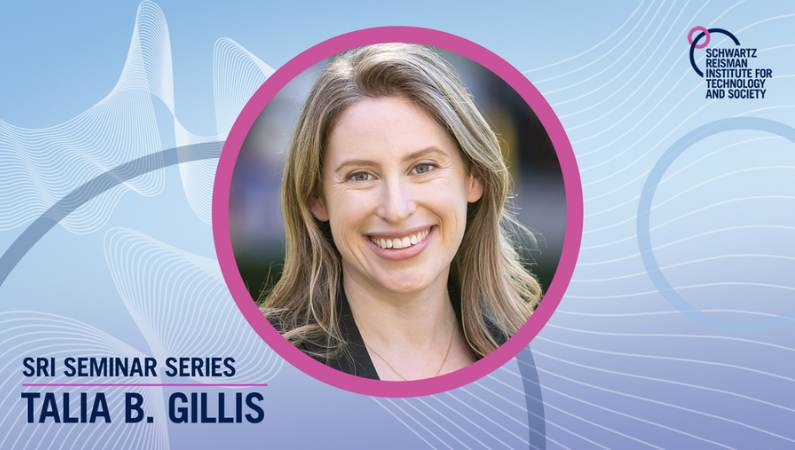

Our weekly SRI Seminar Series welcomes Talia B. Gillis, an associate professor of law and Milton Handler Fellow at Columbia University. Gillis studies the law and economics of consumer markets, household financial behavior, and how consumer welfare is shaped by technological and legal changes, including the impact of regulatory tools.
In this talk, Gillis considers how machine learning predictions affect decisions where a human retains ultimate authority, showing that the inclusion of a biased human decision-maker can revert common relationships between the structure of the algorithm and the qualities of resulting decisions. These finding demonstrate that the study of critical properties of complex decision systems, such as the fairness of machine-assisted human decisions, should go beyond a focus on the underlying algorithmic predictions in isolation.
When machine learning algorithms are deployed in high-stakes decisions, we want to ensure that their deployment leads to fair and equitable outcomes. This concern has motivated a fast-growing literature that focuses on diagnosing and addressing disparities in machine predictions. However, many machine predictions are deployed to assist in decisions where a human decision-maker retains the ultimate decision authority. In this talk, I will consider how properties of machine predictions affect the resulting human decisions. Using a formal model, we show that the inclusion of a biased human decision-maker can revert common relationships between the structure of the algorithm and the qualities of resulting decisions. Specifically, we document that excluding information about protected groups from the prediction may fail to reduce, and may even increase, ultimate disparities. While these concrete results rely on specific assumptions about the data, algorithm, and decision-maker, they show more broadly that any study of critical properties of complex decision systems, such as the fairness of machine-assisted human decisions, should go beyond focusing on the underlying algorithmic predictions in isolation.
T. Gillis, B. McLaughlin, J. Spiess, “On the fairness of machine-assisted human decisions,” arXiv preprint, 2021.
Talia B. Gillis is an associate professor of law and Milton Handler Fellow at Columbia University. Gillis studies the law and economics of consumer markets, and is interested in household financial behavior and how consumer welfare is shaped by technological and legal changes. In her research, Gillis has studied the impact of regulatory tools such as financial disclosures and fiduciary duties on consumer welfare. She also empirically studies the way households manage their financial ebbs and flows and engage in mental accounting. Some of her recent work considers how artificial intelligence, and consumer fintech more broadly, is affecting consumers and raises distributional concerns. Her paper “The Input Fallacy” was the winner of the 2022 AALS Scholarly Papers Competition. Gillis is a recipient of the 2022 Junior Faculty Grant and the Richard Paul Richman Center for Business, Law and Public Policy Grant.
Gillis joined the Columbia Law faculty in 2020 after completing a SJD degree at Harvard and pursuing a PhD in economics. At Harvard, she was a John M. Olin Fellow in Empirical Law and Finance, a Terence M. Considine Fellow in Law and Economics, and a Program on Negotiations Fellow. She clerked for Deputy Chief Justice Hanan Melcer of the Supreme Court of Israel.
To register for the event, visit the official registration page.
The SRI Seminar Series brings together the Schwartz Reisman community and beyond for a robust exchange of ideas that advance scholarship at the intersection of technology and society. Seminars are led by a leading or emerging scholar and feature extensive discussion.
Each week, a featured speaker will present for 45 minutes, followed by an open discussion. Registered attendees will be emailed a Zoom link before the event begins. The event will be recorded and posted online.